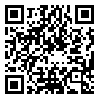Volume 20, Issue 1 (Spring 2025)
jmed 2025, 20(1): 1117-1105 |
Back to browse issues page
Download citation:
BibTeX | RIS | EndNote | Medlars | ProCite | Reference Manager | RefWorks
Send citation to:



BibTeX | RIS | EndNote | Medlars | ProCite | Reference Manager | RefWorks
Send citation to:
Rezaei F, Sedaghat A, Mazidimoradi A, Khezri R, Shahabinia Z, Salehiniya H. Studying the Status of Academic Self-efficacy and its Relationship with Research Self-efficacy in Students of Jahrom University of Medical Sciences, 2024. jmed 2025; 20 (1) :1117-1105
URL: http://jmed.ssu.ac.ir/article-1-1550-en.html
URL: http://jmed.ssu.ac.ir/article-1-1550-en.html
Fatemeh Rezaei 
 , Ali Sedaghat
, Ali Sedaghat 
 , Afroz Mazidimoradi
, Afroz Mazidimoradi 
 , Rozhan Khezri
, Rozhan Khezri 
 , Zahra Shahabinia
, Zahra Shahabinia 
 , Hamid Salehiniya *
, Hamid Salehiniya * 


 , Ali Sedaghat
, Ali Sedaghat 
 , Afroz Mazidimoradi
, Afroz Mazidimoradi 
 , Rozhan Khezri
, Rozhan Khezri 
 , Zahra Shahabinia
, Zahra Shahabinia 
 , Hamid Salehiniya *
, Hamid Salehiniya * 

Associate Professor of Epidemiology, Department of Epidemiology and Biostatistics, School of Health, Social Determinants of Health Research Center, Birjand University of Medical Sciences, Birjand, Iran , alesaleh70@yahoo.com
Abstract: (844 Views)
Introduction: Given the unclear relationship between academic and research self-efficacy and, the present study investigated the association of academic self-efficacy and research self-efficacy in students of Jahrom University of Medical Sciences in 2024.
Method: This descriptive-analytic cross-sectional study included 384 students. The Owen & Froman Research Self-Efficacy Questionnaire and the Phillips & Russell Student Academic Self-Efficacy Questionnaire were used to collect data. Data analysis was performed Independent Sample T-tests, analysis of variance, and Pearson correlation coefficient at a significance level of <0.05.
Results: In this study, the mean age of students was 22.62±2.4 years. Most of the students were female (57.3%), single (90.9%), from the medical school (49.7%), and non-local (77.9%). Based on the results, the academic self-efficacy score was high in 15.6% of the students, moderate in 80.2%, and low in 4.2%. In terms of research self-efficacy, only 26% had high self-efficacy, 46.1% had moderate self-efficacy, and 27.9% had low self-efficacy. No significant association was observed between academic self-efficacy and demographic variables. The research self-efficacy score was significantly lower at the medical school (P = 0.004). A weak inverse linear correlation was observed between research self-efficacy score with academic self-efficacy (r = -0.338, P < 0.0001) and academic semester (r = -0.107, P = 0.03).
Conclusion: Few students reported high academic and research self-efficacy. Thus, implementing short-term practical workshops, curriculum revision, and incentive systems is recommended to enhance students' academic and research self-efficacy.
Method: This descriptive-analytic cross-sectional study included 384 students. The Owen & Froman Research Self-Efficacy Questionnaire and the Phillips & Russell Student Academic Self-Efficacy Questionnaire were used to collect data. Data analysis was performed Independent Sample T-tests, analysis of variance, and Pearson correlation coefficient at a significance level of <0.05.
Results: In this study, the mean age of students was 22.62±2.4 years. Most of the students were female (57.3%), single (90.9%), from the medical school (49.7%), and non-local (77.9%). Based on the results, the academic self-efficacy score was high in 15.6% of the students, moderate in 80.2%, and low in 4.2%. In terms of research self-efficacy, only 26% had high self-efficacy, 46.1% had moderate self-efficacy, and 27.9% had low self-efficacy. No significant association was observed between academic self-efficacy and demographic variables. The research self-efficacy score was significantly lower at the medical school (P = 0.004). A weak inverse linear correlation was observed between research self-efficacy score with academic self-efficacy (r = -0.338, P < 0.0001) and academic semester (r = -0.107, P = 0.03).
Conclusion: Few students reported high academic and research self-efficacy. Thus, implementing short-term practical workshops, curriculum revision, and incentive systems is recommended to enhance students' academic and research self-efficacy.
Type of Study: Research |
Subject:
Medical Education
Received: 2025/03/14 | Accepted: 2025/06/8 | Published: 2025/06/29
Received: 2025/03/14 | Accepted: 2025/06/8 | Published: 2025/06/29
Send email to the article author
| Rights and permissions | |
 |
This work is licensed under a Creative Commons Attribution-NonCommercial 4.0 International License. |




